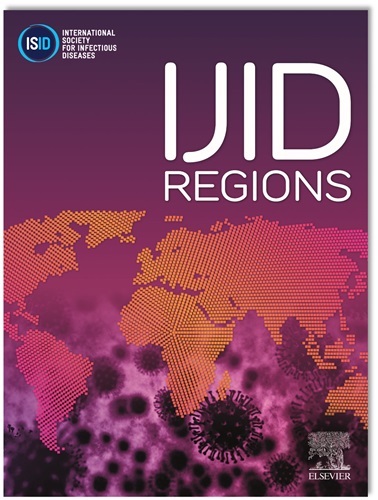Adverse reactions to trimethoprim/sulfamethoxazole for melioidosis eradication therapy: An evaluation of frequency and risk factors
IF 4.8
2区 医学
Q1 INFECTIOUS DISEASES
引用次数: 0
Abstract
Trimethoprim/sulfamethoxazole is the first-line agent for oral eradication therapy for melioidosis but has been associated with toxicity in this context. This study aimed to quantify adverse drug reactions (ADRs) to trimethoprim/sulfamethoxazole when used for treatment of melioidosis, and assess risk factors for ADR development. A retrospective review of antimicrobial associated ADRs was performed in all patients treated for melioidosis in the Northern Territory of Australia from January 2017-September 2022. Over this time, 268 treatment episodes from 256 individuals were included. The frequency of clinician-attributed ADRs to trimethoprim/sulfamethoxazole (51% of exposed) was higher than for other antimicrobials used (ceftazidime 12%, meropenem 8%, and doxycycline 12% of those exposed; P < 0.0001). 44% of those treated with trimethoprim/sulfamethoxazole required drug cessation or dose reduction and 5 individuals (2%) had a severe cutaneous adverse reaction, with one fatality. Acute kidney injury was the most frequent ADR (25% of those exposed), with age and pre-existing renal disease independently associated with its development. Here we report very high rates of ADRs attributed to trimethoprim/sulfamethoxazole resulting in frequent discontinuation of this drug as part of oral eradication therapy for melioidosis. Further work is needed to balance the necessity and toxicity of this drug in this clinical context.
三甲双胍/磺胺甲噁唑根除类鼻疽疗法的不良反应:频率和风险因素评估。
三甲双胍/磺胺甲噁唑是口服根除类鼻疽疗法的一线药物,但也存在毒性反应。本研究旨在量化三甲双胍/磺胺甲噁唑用于治疗类鼻疽时产生的药物不良反应(ADR),并评估产生药物不良反应的风险因素。从2017年1月至2022年9月,我们对澳大利亚北部地区所有接受类鼻疽治疗的患者进行了抗菌药物相关不良反应回顾性研究。在此期间,共纳入了 256 人的 268 次治疗。临床医生归因于三甲双胍/磺胺甲噁唑的 ADRs(占暴露人数的 51%)高于其他抗菌药物(占暴露人数的头孢他啶 12%、美罗培南 8%、强力霉素 12%;P<0.05)。
本文章由计算机程序翻译,如有差异,请以英文原文为准。
求助全文
约1分钟内获得全文
求助全文
来源期刊
CiteScore
18.90
自引率
2.40%
发文量
1020
审稿时长
30 days
期刊介绍:
International Journal of Infectious Diseases (IJID)
Publisher: International Society for Infectious Diseases
Publication Frequency: Monthly
Type: Peer-reviewed, Open Access
Scope:
Publishes original clinical and laboratory-based research.
Reports clinical trials, reviews, and some case reports.
Focuses on epidemiology, clinical diagnosis, treatment, and control of infectious diseases.
Emphasizes diseases common in under-resourced countries.

 求助内容:
求助内容: 应助结果提醒方式:
应助结果提醒方式:


